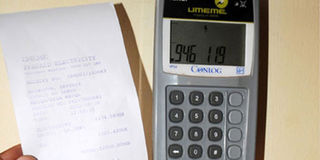Here’s how to manage those utility bills

Ensure security lights are off during day and bathroom lights are not left on when not in use. File Photo
What you need to know:
- The coronavirus lockdown has either increased the number of people at home or the number of hours spent at home. This has automatically affected the expenditure of families. Unfortunately, among the things most families can’t do away with are utilities, especially water and electricity.
At the start of the lockdown, many people were calling on government to either reduce the cost of utilities, especially water and electricity or provide the services for free.
Although agencies like National Water and Sewerage Cooperation announced that they will not disconnect any one during this lockdown, it does not mean water bills will not be paid.
The water may not be disconnected but the bill will accumulate, and you will have to clear it.
The high costs will also apply to electricity. Umeme, the energy regulating company in the country, said it will not reduce electricity tariff or offer free power to Ugandans during this lockdown because of concessional agreements. This means your electricity bill will automatically be higher than the usual because of staying home longer hours.
“I used to spend Shs10,000 a month [on electricity], but since the lockdown, I use Shs15,000, the children are glued to TV from as early as 7am to 10pm. I have no other way I can keep the children busy,” says Rhoda Ayebazibwe, a resident of Kashanyarazi, Mbarara Town.
But how can you manage or reduce the cost of utilities?
Water
Water harvesting
The ongoing rain season should be an opportunity for you to harvest water to use during lockdown. If you do not have a water tank, you do not have to worry about extra costs now. You can make use of what you already have to harvest and store this water. This harvested water can help you save on piped water.
Reuse water
You can choose to use water for different activities without pouring it away. For example, you can use the water you used to wash your clothes or clean utensils to wash your bicycle, car, or mop the house and kitchen.
Fix leakages
Leakages can be a source of water wastage at home. So, as you stay home, make sure you supervise all water connections in your home, the pipes, taps, and bathrooms to ensure all water leakages are stopped.
Washing clothes at a ago
In this period, wash clothes in full rounds than washing a few clothes several times a week. Choosing to wash clothes in full rounds than a few of them can save the amount of water to be used, and those using machines, it will save on electricity as well.
Always turn off water taps
There can be a tendency for example when brushing teeth, to leave the tap running until you finish, but you can turn off the water. Also, always check that all the water points are turned off. Sometimes family members may forget to turn the taps off.
Electricity
Limit TV time
Now that children are at home, they might tend to keep glued on TV all the time but even where they are no children, even adults might choose to beat boredom by watching TV. You can substitute watching of TV with other activities such as indoor games, sports, and storytelling.
Use of alternative sources of energy
Instead of using cookers, water heaters, you can use a charcoal stove. Also, if you can get firewood, it can help as they say desperate times call for desperate measures. You can also make briquettes using charcoal dust and banana peelings.
Don’t over dry clothes
When ironing, dry clothes take more energy than clothes that are a little damp therefore do not let your clothes dry completely.
Use energy saving appliances
Use energy saving equipment such as energy saving bulbs, energy saving fridges. Using these can help lower your electricity bill.
Unplug appliances not in use
Some of the appliances you use at home like TV, washing machines have a standby mode and may continue to consume power even when they are not in use. Therefore, to save power, turn them off completely.
Bulbs and computers
Turn off bulbs and computers not in use. For instance, ensure security lights are off during day and bathroom lights are not left on when not in use.




